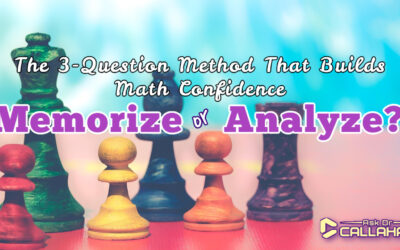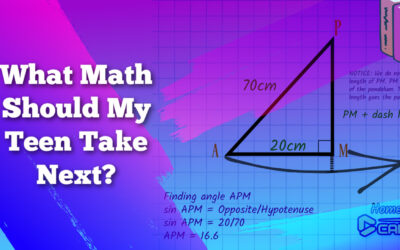The U.S. schools are weak in math – almost all of them regardless of public, private, or homeschool. The national weakness in math (and science – which is related) is a growing problem. Math and science are required for all STEM (Science, Technology, Engineering, and Mathematics) careers. Math is also required for technological research, and research (like it or not) is required for national security. The fact is a majority of U.S. university graduate students in technology areas are from other countries – many with less than stable political systems. Congress and agencies that deal with national security are well aware of the problem – but fixing it is another challenge.
But what about homeschoolers?
Homeschoolers typically outperform everyone in everything – right? Wrong. Homeschoolers are weak in math.
“Homeschoolers need to do better in math. Our reading and language skills are excellent, even though we could always use a little improvement. But our math skills need real help. We only do slightly better than public schools here. We need to drill basic facts, teach concepts, and make sure we take our children through algebra II and geometry at a minimum.” [Mike Farris, “Aim high(er):,” World Magazine, April 28, 2001, Vol. 16. ]
Even though that quote is from years ago – not much has changed.
Besides the personal implications of future employment in a technology world, we need to consider the apologetic issues. Many Christians have been taken out of scientific debates about the origins of the universe, evolution, astronomy, etc due to their raw lack of basic knowledge about math and science. Remember – theologians of the past have been astute students of both the Bible and nature – what systematic theology calls special and general revelation from God.
(Note – our courses are not faith-based – but we are Christians. We firmly believe that we do not need to force our faith into places like math – we just speak the truth. Many who have chased truth who do not believe in the God of the Bible have found the path to truth led them to their faith – including me.)
But the problem we have as parents is that we too were raised in a school system that was often inadequate to prepare us to teach our own children. Even then, most of us who did take the advanced math and science course have long since forgotten the skills we once had in the areas of math and science.
Are we preparing our children to live in an age of technology? …defend the faith against scientific attacks? …teach their children? Just as language is the way to study the written word of God or special revelation, math is the language used to study nature or general revelation.
So we have written this part to answer some other specific questions we often get about math.
What types of textbooks should I buy?
We suggest you lean toward college-level textbooks in the Algebra II w/ Trig and Calculus courses – if not before. If you know where your child plans to go to college, find out what math they will need, get a syllabus, and use that text. (Our daughter would have to take one course in Calculus in her degree field, so we taught her the same calculus in the same book. She found the college calculus course just a review.) High school textbooks tend to be written with easier problems than the college level textbooks. See the From the Trenches below.
From the Trenches
As a fairly new member to the engineering faculty, I had learned that graduation rates in engineering and science had been down in all United States colleges and universities for the past twenty plus years. Most of this was because the high schools did not provide adequate training in math, so incoming students often got discouraged and moved into other fields. My curiosity drove me to call our math department and ask how students in general did in our calculus courses. The head of the undergraduate program explained that two local high schools outperformed all other students in math. (Both were public schools.) So I went to the math department at one of these schools and I asked what they did that made them better. The biggest issue was they used college level textbooks. They explained to me that the high school textbook publishers competed on how easy the problems were to work. The college level publishers would never survive if they watered down the material.
So the schools that use watered down material in their textbooks have built a large gulf between their math courses and the universities math courses. The few hours we spent at the local high school were convincing – and we have never turned back from college textbooks.
What about Saxon Math?
We often get asked about the Saxon math material. It seems people either love Saxon or hate it, but few are neutral. In our view, Saxon provides an excellent base in the younger years when we are starting to learn the concepts of math as well as the basic facts. However, we steer away from Saxon in high school math courses (algebra, geometry, algebra 2 with trig, and calculus). Now before you send us letters of how well your children did in Saxon let us say that any math material can do a great job depending on the student. Some students can learn math from a rock.
Our problem with Saxon is the way it teachers in a choppy and circular manner – or as Saxon refers to it – incremental. The incremental method is a big selling point of Saxon – but it falls terribly short in the later grades for two reasons:
- Saxon textbooks are difficult to use as a reference. Good math textbooks (algebra and above) should be good reference material for future math courses. Since Saxon does things incrementally, it is difficult to go and find a reasonable treatment of any subject in one place, therefore making the Saxon material less than adequate for math reference. This also creates a challenge to parents trying to help their son or daughter with a concept. When we try to get to the root of an issue we often need to go back to where that subject was covered to make sure we (as the teacher) understand what the author is trying to do. In Saxon, this is very difficult to do.
- Lack of practical applications. One thing we have learned from teaching math, science, and engineering courses is that application is very important. Often I am asked questions such as “why would anyone ever use this?” (I must agree, that is how I – and probably you – always viewed math.) When I hear this question I will discuss how these elements are used in engineering, sales and marketing, construction, medicine, and yes homemaking. We have had discussions about aircraft, electronics, lighting, the space shuttle, relativity, high blood pressure, lung capacity, cooking, household cleaners, and chemicals, (on and on) as part of the answers to these questions. When these discussions take place with students I see an element of excitement in the students that were not seen before. Teaching someone what a hammer is and does is nice, but showing them how it is used to build a house is an education! Saxon (and others) is weak in this area.
So, if you want to use Saxon, I encourage you to do two things. 1) Find a good math reference material. Some books such as Schaum’s outlines or related inexpensive material might suffice here. 2) Find a source to get at applications of the math. The best source of this material is to use the web and have your children find ways in which the math they are using is used in the “real” world. However, this might be a challenge at times, so a supplement of another type of math text on the same subject would be useful.
How does math fit into Classical Education?
Classical education has become very popular, and we are big fans of it. But frankly, it is weak in math, and possibly weak in science. Conventional wisdom on classical homeschooling has the higher math courses as electives at best. Yet many sources for classical education recommend reading material written by Copernicus, Kepler, and Einstein as part of the science curriculum. Without knowledge of calculus, these works would be overwhelming. So if you like the classical approach we applaud you – just do not skip on the math! At the very least, your children should get through Algebra II with Trig.
What math material should I use?
Here is a big question! We have often been asked to review math material – and overall we are disappointed in what is available for homeschooling in the area of math. Not that the concepts are missing, but the method of presentation is similar to the presentation given in the public and private schools. Dry and without any application to the real world. College textbooks are (in general) richer in their treatment and application of the concepts. However, you may need some outside help with the textbooks since they are designed to be instructor based.
Any curriculum is OK as long as it meets the basic objectives of the course title. The rest is how well your child takes to it. If they love it, you have found a perfect match. The section Evaluating Math Texts will give some guidelines for picking the proper math curriculum.






